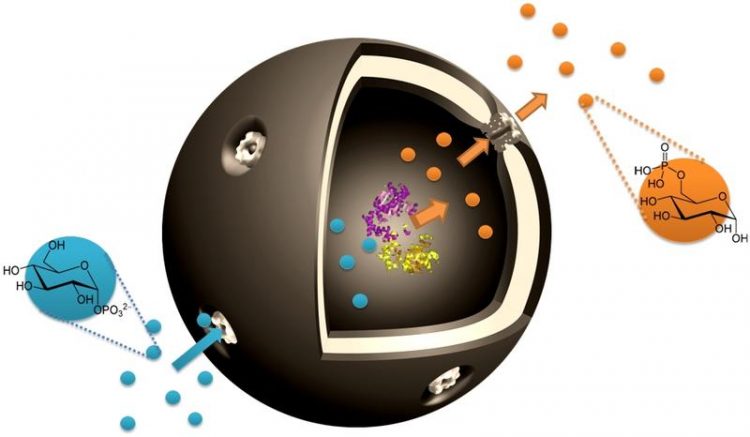Nanocapsules Enable Cell-Inspired Metabolic Reactions

Schematic illustration of the bio-catalytic nanocompartment with encapsulated enzyme phosphoglucomutase for the conversion of glucose-1-phosphate into the desired product glucose-6-phosphate. University of Basel
Metabolic processes inside living organisms involve a large variety of bio-molecules. These molecules are produced by specific enzymatic reactions. One example of such a bio-molecule is glucose-6-phosphate, a metabolite that is involved in important metabolic processes.
It is central in the degradation of carbohydrates and can also be converted further into specific molecules responsible for storing energy within an organism. If such bio-molecules can be produced directly inside living cells, new perspectives in the treatment of disease would open up.
Nanocapsules produce glucose-6-phosphate
Researchers led by Prof. Cornelia Palivan from the Department of Chemistry at the University of Basel have designed bio-catalytic capsules that contain the active enzyme phosphoglucomutase and can produce and release glucose-6-phosphate.
To start the reaction, the substrate required for the reaction has to be able to enter the capsule. The researchers thus inserted a pore protein synthesized at ETH Zurich in the walls of the capsules. These pores are the entry door for the substrate and the exit for the product glucose-6-phosphate, while the enzyme remains encapsulated and protected against degradation.
The developed nanocapsules are less than 200 nanometers in size, which means they can be taken up by cells, an important prerequisite for future testing and application.
Unlike other approaches that use organic solvents, the researchers develop their capsules in conditions very similar to those in nature. “Our approach is always to be as nature-like as possible,” says Palivan “so we can preserve the intrinsic bio-functionality of the enzymes and pore proteins.”
In a next step, the researchers will now test the capsules on cells, to see if they are taken up and then produce glucose-6-phosphate inside the cell.
Original source
Mihai Lomora, Gesine Gunkel-Grabole, Shiksha Mantri and Cornelia G. Palivan
Bio-catalytic nanocompartments for in situ production of glucose-6-phosphate
Chemical Communications (2017), doi: 10.1039/C7CC04739H
Further information
Cornelia G. Palivan, University of Basel, Department of Chemistry, Tel. +41 61 267 38 39, email: Cornelia.Palivan@unibas.ch
Gesine Gunkel-Grabode, University of Basel, Department of Chemistry, Tel. +41 61 207 38 43, email: Gesine.Gunkel@unibas.ch
https://www.unibas.ch/en/News-Events/News/Uni-Research/Nanocapsules.html
Media Contact
All latest news from the category: Physics and Astronomy
This area deals with the fundamental laws and building blocks of nature and how they interact, the properties and the behavior of matter, and research into space and time and their structures.
innovations-report provides in-depth reports and articles on subjects such as astrophysics, laser technologies, nuclear, quantum, particle and solid-state physics, nanotechnologies, planetary research and findings (Mars, Venus) and developments related to the Hubble Telescope.
Newest articles

High-energy-density aqueous battery based on halogen multi-electron transfer
Traditional non-aqueous lithium-ion batteries have a high energy density, but their safety is compromised due to the flammable organic electrolytes they utilize. Aqueous batteries use water as the solvent for…

First-ever combined heart pump and pig kidney transplant
…gives new hope to patient with terminal illness. Surgeons at NYU Langone Health performed the first-ever combined mechanical heart pump and gene-edited pig kidney transplant surgery in a 54-year-old woman…

Biophysics: Testing how well biomarkers work
LMU researchers have developed a method to determine how reliably target proteins can be labeled using super-resolution fluorescence microscopy. Modern microscopy techniques make it possible to examine the inner workings…





















